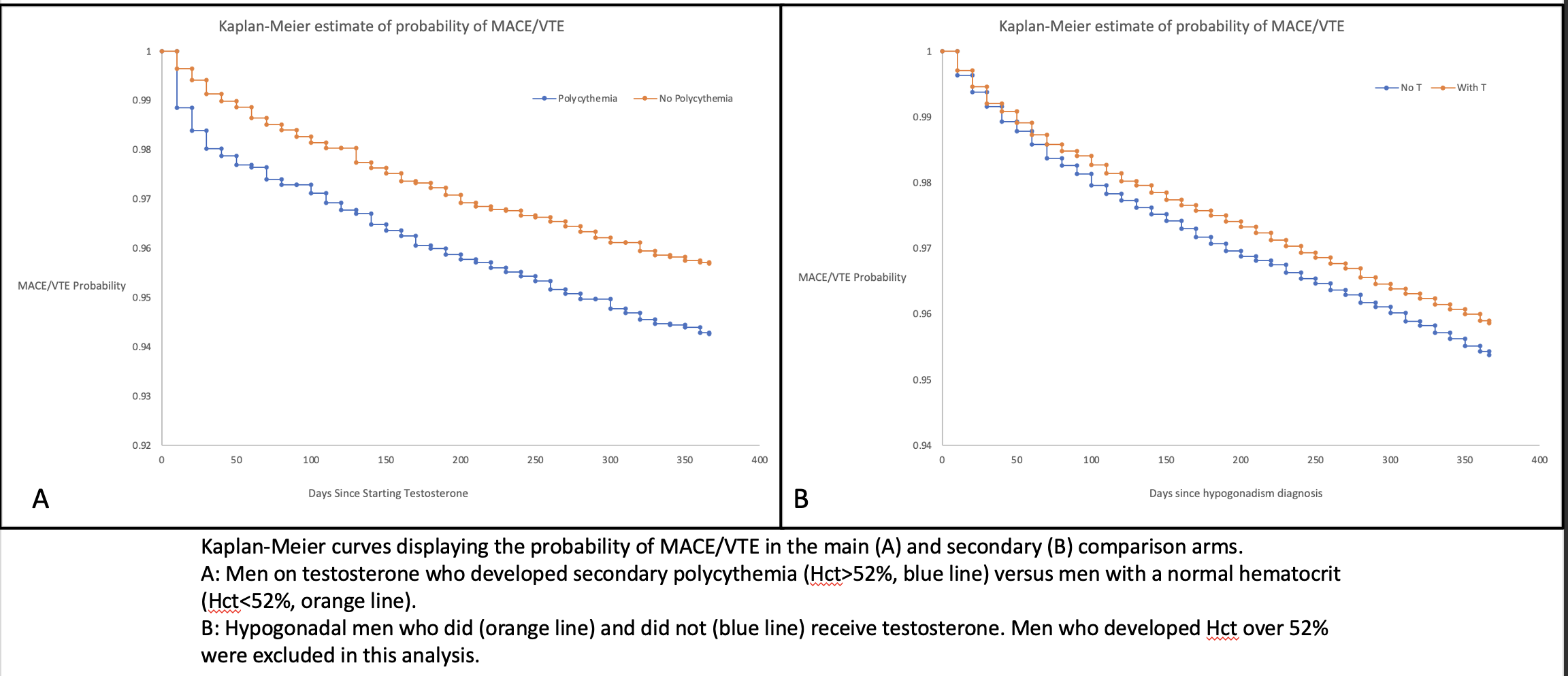Back
Poster, Podium & Video Sessions
Podium
PD49: Sexual Function/Dysfunction: Medical, Hormonal & Non-surgical Therapy II
PD49-01: Secondary Polycythemia While on Testosterone Therapy Increases Risk of Major Adverse Cardiovascular Events and Venous Thromboembolism in Men: Insights from a Global Health Research Network.
Sunday, May 15, 2022
3:30 PM – 3:40 PM
Location: Room 252
Jesse Ory, Halifax, Canada, Sirpi Nackeeran*, Navin Balaji, Joshua Hare, Ranjith Ramasamy, Miami, FL
- SN
Sirpi Nackeeran, BA
University of Miami, Miller School of Medicine
Podium Presenter(s)
Introduction: An unsafe hematocrit threshold for men receiving testosterone therapy (TT) has never been tested. This study seeks to determine whether secondary polycythemia among men receiving TT confers an increased risk of major adverse cardiovascular events (MACE) and venous thromboembolic events (VTE).
Methods: Using a multi-institutional database of 74 million patients, we identified two cohorts of men with low testosterone (Total T < 350ng/dl) who received TT for at least 9 months, and subsequently either developed polycythemia (N=5887) or did not (N=42784). Polycythemia was defined as hematocrit = 52%. As a secondary objective, we identified two cohorts of hypogonadal men without polycythemia, who either did (N=26,880) or did not (N=27,430) receive TT. Our primary outcome was the incidence of MACE and VTE in the first year after starting TT. We conducted a Kaplan-Meier survival analysis to assess incidence of MACE and VTE, and measured associations using odds ratios. We controlled for covariates through propensity score matching.
Results: Men who developed polycythemia were older (mean age 54 +/-12.5 versus 52 +/-14.8, p<0.01) and had a higher prevalence of obstructive sleep apnea, dyslipidemia, smoking, obesity and hypertension. After propensity score matching, 5,842 who received TT and developed polycythemia were compared to 5,842 men who did not develop polycythemia. Men with polycythemia had a higher risk of MACE/VTE (number of outcomes: 301, 5.15%) than men who had normal hematocrit (N: 226, 3.87%) while on TT (OR 1.35, 95%CI 1.13-1.61, p<0.001). In hypogonadal men who received testosterone, no increased risk of MACE and VTE was identified as compared to hypogonadal men naïve to TT.
Conclusions: In the first year after starting testosterone therapy, development of secondary polycythemia significantly increases the risk for MACE and VTE in a matched cohort of men. To our knowledge, this is the first study that demonstrates secondary polycythemia as a possible underlying etiology associating TT and major adverse cardiovascular events. Physicians should counsel men on the small but real risk of MACE and monitor hematocrit among men receiving T therapy.
Source of Funding: Acerus Pharmaceuticals

Methods: Using a multi-institutional database of 74 million patients, we identified two cohorts of men with low testosterone (Total T < 350ng/dl) who received TT for at least 9 months, and subsequently either developed polycythemia (N=5887) or did not (N=42784). Polycythemia was defined as hematocrit = 52%. As a secondary objective, we identified two cohorts of hypogonadal men without polycythemia, who either did (N=26,880) or did not (N=27,430) receive TT. Our primary outcome was the incidence of MACE and VTE in the first year after starting TT. We conducted a Kaplan-Meier survival analysis to assess incidence of MACE and VTE, and measured associations using odds ratios. We controlled for covariates through propensity score matching.
Results: Men who developed polycythemia were older (mean age 54 +/-12.5 versus 52 +/-14.8, p<0.01) and had a higher prevalence of obstructive sleep apnea, dyslipidemia, smoking, obesity and hypertension. After propensity score matching, 5,842 who received TT and developed polycythemia were compared to 5,842 men who did not develop polycythemia. Men with polycythemia had a higher risk of MACE/VTE (number of outcomes: 301, 5.15%) than men who had normal hematocrit (N: 226, 3.87%) while on TT (OR 1.35, 95%CI 1.13-1.61, p<0.001). In hypogonadal men who received testosterone, no increased risk of MACE and VTE was identified as compared to hypogonadal men naïve to TT.
Conclusions: In the first year after starting testosterone therapy, development of secondary polycythemia significantly increases the risk for MACE and VTE in a matched cohort of men. To our knowledge, this is the first study that demonstrates secondary polycythemia as a possible underlying etiology associating TT and major adverse cardiovascular events. Physicians should counsel men on the small but real risk of MACE and monitor hematocrit among men receiving T therapy.
Source of Funding: Acerus Pharmaceuticals


.jpg)
.jpg)